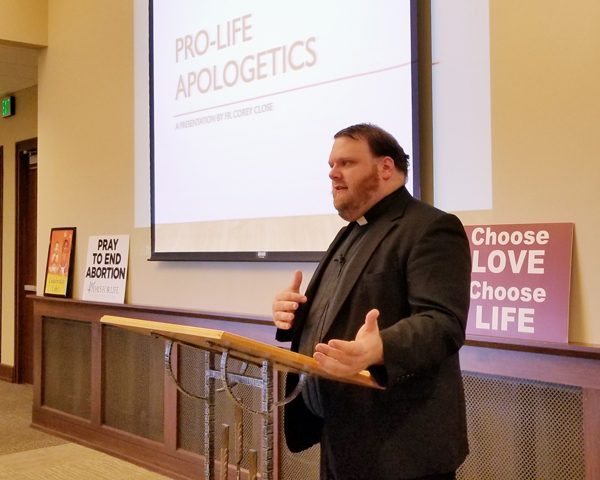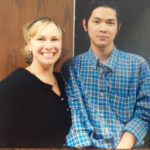
Father Corey Close, pastor of parishes in Brooklyn and Victor, speaks about defending the pro-life position during a talk last month at St. Patrick Parish in Iowa City.
By Lindsay Steele
The Catholic Messenger
“Everyone sees and feels the division of our country on the issue of abortion,” said Father Corey Close. The harder one side pushes, the harder the other pushes back. At times, the fight to change hearts toward choosing life may seem impossible. But pro-life supporters need to be persistent and persuasive, said Fr. Close, who serves as pastor of parishes in Brooklyn and Victor and is a chaplain for a post-abortion ministry.
Last month, Fr. Close offered a presentation, “A Turning Point: Ending the Scourge of Abortion,” at St. Patrick Parish in Iowa City. During the presentation, he talked about the pro-choice position and explained how to respond in a persuasive manner.
“In our culture we sense that something is happening regarding this issue. Both sides are more ramped up,” Fr. Close observed.
A 2019 Gallup poll indicates that Americans as a whole are split on the topic of abortion. The division can also be seen at the state level. In the past couple years, some states —including Iowa — have attempted to restrict access to abortion. States such as Illinois have loosened abortion restrictions.
“There’s a lot more going on here than just bad laws,” Fr. Close said. In general, he believes that pro-choice ideology on abortion has shifted from “a necessary evil to a good” to “a fundamental human right.” In the midst of this cultural shift, pro-life individuals can pray and work toward changing hearts of people who support the right to abortion.
Not all people who identify as pro-choice have confidence in their stance, Fr. Close told the gathering. Some will defend their position under any circumstance. These people tend to be the hardest to reach, he said. However, many people follow what he calls a “soft pro-abortion” stance, meaning they don’t like the idea of abortion but don’t believe it should be completely banned. These individuals are generally more receptive to having a rational discussion on the issue of abortion, he said. “These are the ones pro-life apologetics can really affect.”
Prior to entering the seminary, Fr. Close considered himself to be of the “soft pro-abortion” mindset. “The culture had taught me to not think about it, that it wasn’t really something I had any say in.” He changed his stance once he considered the reality of abortion: the taking of a human life. “It was a very easy conversion for me.”
He noted that from the moment of conception, humans have a unique set of DNA which is neither the mother’s nor the father’s. “From the moment of conception, almost every physical factor has already been determined: hair color, eye color, etc.”
When people accept an unborn child as a unique human life, it becomes more difficult to defend the right to end that life through abortion.
Fr. Close identified common pro-choice arguments:
• The economic hardship argument claims that life will be so terrible for the unborn child that the child’s life may as well be ended. “The argument is pretty terrible from a moral standpoint,” Fr. Close said. “What gives you the right to judge that (unborn children) are unworthy of life?”
• The women’s rights argument. The “pro-abortion lobby” has shifted the debate from abortion being a “necessary evil” to a human rights issue in which women choose what they believe is best for their bodies. Planned Parenthood, for example, markets abortion as reproductive health care. Pro-life supporters are not trying to regulate a woman’s body. They are trying to save the life of an unborn child.
• The traumatic conception argument, which justifies abortion in the event of a traumatic experience, such as a child conceived as a result of rape. The unborn child is human, regardless of how that child was conceived, Fr. Close said. Abortion is not the solution to that traumatic experience. Emphasis should be placed on prosecuting the rapist and giving the victim the resources she needs to heal.
• The “I’m personally against but…” argument — Some individuals say they are personally against abortion but don’t believe they have the right to tell others what to do. Fr. Close thinks that argument means those individuals haven’t thought through the issue. Would they also fail to speak up when the issue involves genocide or eugenics, for example?
• The reproductive rights argument — Pro-choice supporters believe they have a right to decide when and if to reproduce and that abortion is one option available to them. Fr. Close sees that argument as a way to avoid parenting responsibilities. The mindset is “I don’t want to parent this child.”
With careful persuasion, Fr. Close believes pro-life individuals can help pro-choice individuals to “see the truth. We have the truth on our side.”











